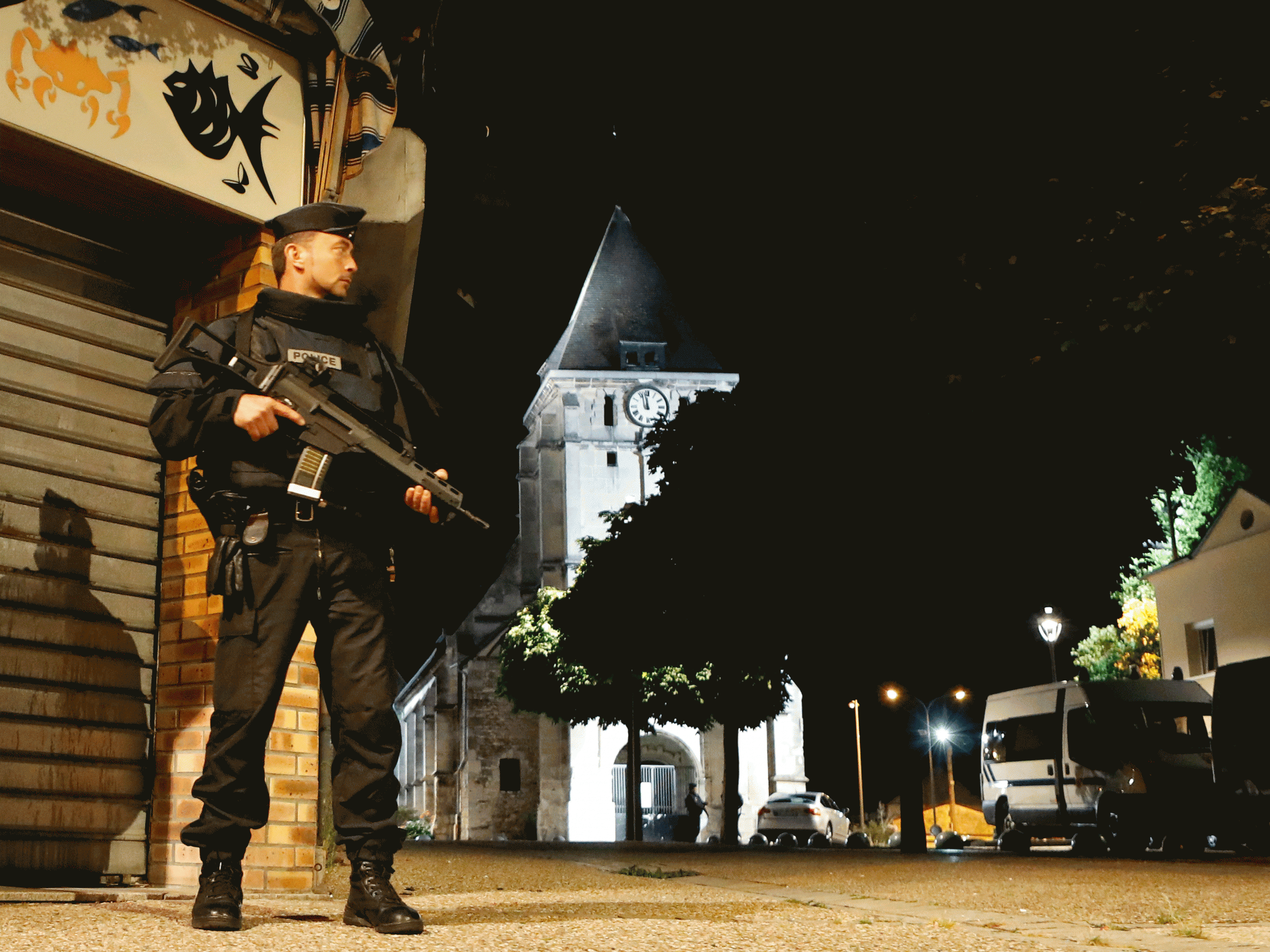Normandy attack: UK churches should have guards following Rouen priest killing, says intelligence expert
Former chair of Cobra intelligence group also says defeating Isis through bombing will reduce its lure for youngsters

Your support helps us to tell the story
From reproductive rights to climate change to Big Tech, The Independent is on the ground when the story is developing. Whether it's investigating the financials of Elon Musk's pro-Trump PAC or producing our latest documentary, 'The A Word', which shines a light on the American women fighting for reproductive rights, we know how important it is to parse out the facts from the messaging.
At such a critical moment in US history, we need reporters on the ground. Your donation allows us to keep sending journalists to speak to both sides of the story.
The Independent is trusted by Americans across the entire political spectrum. And unlike many other quality news outlets, we choose not to lock Americans out of our reporting and analysis with paywalls. We believe quality journalism should be available to everyone, paid for by those who can afford it.
Your support makes all the difference.Churches in areas where there is a threat of radical jihadism in the UK should consider having their own guards as part of tighter security measures following the terrorist attack on a French priest, according to a former top intelligence adviser to the government.
Colonel Richard Kemp, a former chair of the government's Cobra crisis response group, has said in interview with The Independent that community-funded guards, security fences and CCTV ought to be considered by churches.
He emphasised such measures could not "guarantee" total safety but that similarly visible security outside Jewish synagogues was already being used as a "deterrent" and the Church of England and Catholic Church may wish to do the same.
In the interview Colonel Kemp, who was the first commander of British troops in Afghanistan after 9/11, also said:
- Many Muslims were "sympathetic" to the aims and tenets of radical jihadism as displayed by terrorist group Isis
- Bombing Isis in Syria and Iraq was the only way to reduce the attraction of the extremist group for potential recruits
- Muslims everywhere should voice their condemnation of the group as loudly as possible.
But he said the immediate response to the murder in France should be to consider the security around many churches.
He said: "Both the police in the UK and church authorities should review the security of churches. The reality is not that a church has suddenly become a new target and nothing else - there is virtually nothing else in the UK that is not a target, with the possible exception of mosques.
"But churches should think about use of CCTV as a deterrent, and the presence of security outside. But in the same way as a shopping centre or railway station, churches cannot become a fortress because people need free access to it.
"They couldn't actually stop an attacker getting in who really wanted to, but especially in areas where there has been a threat from radical jihadists, they might want to consider that.
"It's about that balance between safety and living freely and in a democracy."
The Home Office announced on 26 July that a £2.4m fund would be made available to any place of worship - church, mosque, synagogue or temple - which bidded successfully for an increase in its security measures.
And although the National Police Chief's Council is also circulating "specific advice" on security to Christian places of worship, a spokesperson said: "There is no specific intelligence relating to attacks against the Christian community in the UK. However, as we have seen, Daesh and other terrorist groups have targeted Christian as well as Jewish and other faith groups in the West and beyond."
The advice was issued after two young men hailed by Isis as "soldiers" murdered a clergyman near Rouen in France, with the main perpetrator's relative saying his nephew had been radicalised.
Colonel Kemp told The Independent only bombing Isis in Syria and Iraq would make the group seem less successful - and so less inspirational - to would-be jihadists in Europe and elsewhere.
He said that although mosques from "the wrong sect" of Islam and Muslims who spoke out against extremists were also at risk from attack, too many Muslims were sympathetic to Isis's aims. And he claimed they did not voice their condemnation loudly enough.
"Those Muslims who disagree with the violence of jihadists need to stand up, because it can only really be dealt with by them," he said.
"Frankly I don't think the answer is for us to be seen to be behind them - it has to come from them.
"But there is a worryingly large number of Muslims who support the Islamic state. Many Muslims believe that what the Islamic State are doing is Islam.
"I mean Muslims everywhere, they follow the Quran, they follow the same faith. Many are sympathetic to the Islamic State."
Pew Research Centre showed that, with the exception of Pakistan, countries in the Middle East were overwhelmingly critical of Isis, with upwards of 80 or 90 per cent of populations saying they felt unfavourably towards it.
The Church of England said it would double-check security provision in areas with "known risks".
"Church buildings are public buildings that are open to all. Where there are known risks, churches take measures to ensure the safety and security of worshippers and visitors," said a spokesperson.
"We welcome the Home Office announcement yesterday of funding for security measures for places of worship, which will benefit all faith communities. All public ministry involves being vulnerable to others, so security measures are good sense in uncertain times.”
Join our commenting forum
Join thought-provoking conversations, follow other Independent readers and see their replies
Comments